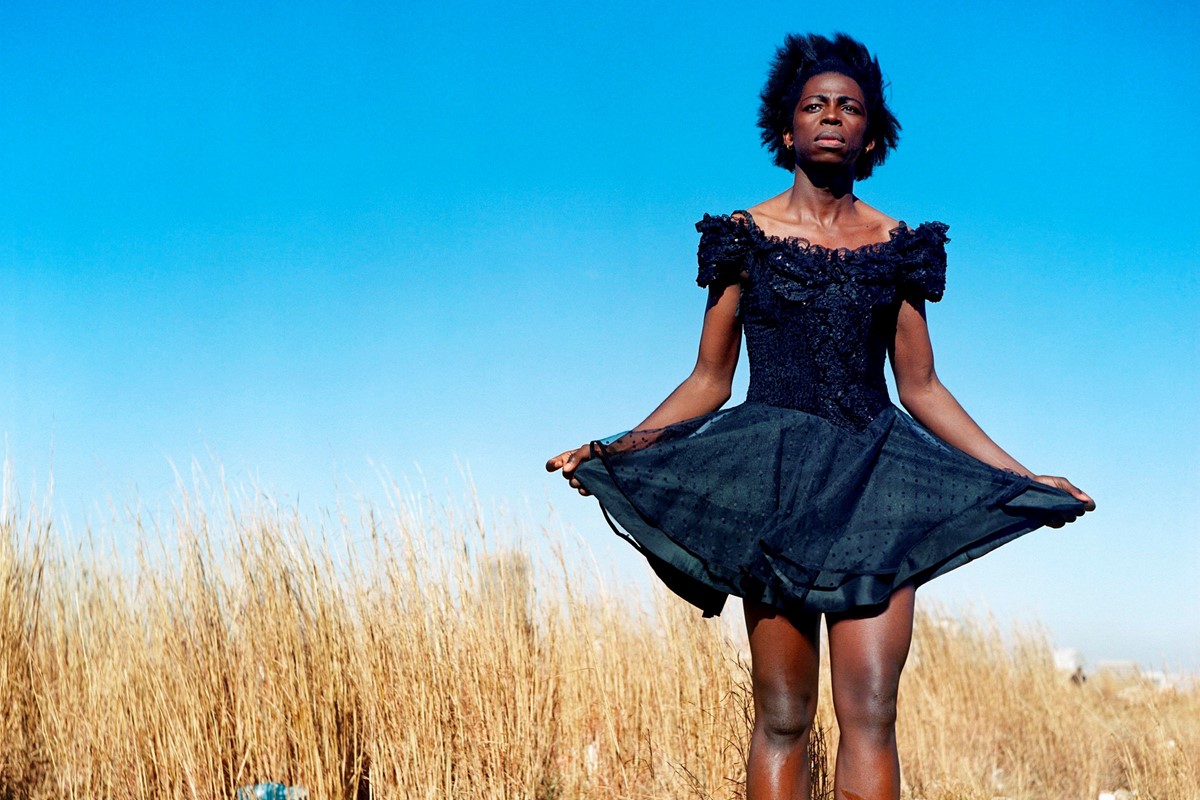
© » KADIST
Pascal Shirley
Gypsy shows an ambivalent scene, in which broken blinds and its unsmiling subject are balanced with the stilllife plentitude of watermelon slices and the beautifully lit nudity of the sitter. The room seems messy and in disrepair, but simultaneously romanticizes the scene. The fruit and the sitter suggest a robustness in contrast with the mise-en-scene.

© » KADIST
Pascal Shirley
Like many of Pascal Shirley’s photographs, Oakland Girls aestheticizes a dingy rooftop and a cloudy sky. The women in the photograph exist ambiguously here. The photograph’s title, the subject’s outfits, and their environment suggest that they are both trapped and glorified within their position.

© » KADIST
Zanele Muholi
As a visual activist for the rights of Lesbian, gay, bisexual, transgender, queer and intersex (LBGTQI), Muholi’s photographs radically transgress the conventional perception of lesbian and transgender communities in South Africa. Members of the LBGTQI community who suffer from continuous attacks — “corrective” and “curative rapes”, physical and psychological assaults, and hate crimes — Muholi works from her own community to create strong and positive images of empowered individuals. As visual statements, her photographs seek to dignify the members of an often hidden, voiceless and marginalized community.

© » KADIST
Zanele Muholi
As a visual activist for the rights of Lesbian, gay, bisexual, transgender, queer and intersex (LBGTQI), Muholi’s photographs radically transgress the conventional perception of lesbian and transgender communities in South Africa. Members of the LBGTQI community who suffer from continuous attacks — “corrective” and “curative rapes”, physical and psychological assaults, and hate crimes — Muholi works from her own community to create strong and positive images of empowered individuals. As visual statements, her photographs seek to dignify the members of an often hidden, voiceless and marginalized community.

© » KADIST
Zanele Muholi
As a visual activist for the rights of Lesbian, gay, bisexual, transgender, queer and intersex (LBGTQI), Muholi’s photographs radically transgress the conventional perception of lesbian and transgender communities in South Africa. Members of the LBGTQI community who suffer from continuous attacks — “corrective” and “curative rapes”, physical and psychological assaults, and hate crimes — Muholi works from her own community to create strong and positive images of empowered individuals. As visual statements, her photographs seek to dignify the members of an often hidden, voiceless and marginalized community.
Zanele Muholi
- year born: 1972
- gender: female
- nationality: South African
- home town: Umlazi, Durban, South Africa
Pascal Shirley
Pascal Shirley’s photographs portray a California of beaches, music festivals, families, and hipsters wandering through the hills...

© » ANOTHER
about 20 months ago (02/12/2024)
Zanele Muholi’s Potent Portrait of South Africa’s Queer Community | AnOther As their new exhibition opens in San Francisco, Zanele Muholi talks about their powerful photos of queer survivors of hate crimes, couples in everyday moments, and self-portraits referencing history February 02, 2024 Text Emily Steer Zanele Muholi creates potent portraits...
-
2000-2009
Pascal Shirley
2006Gypsy shows an ambivalent scene, in which broken blinds and its unsmiling subject are balanced with the stilllife plentitude of watermelon slices and the beautifully lit nudity of the sitter...
Pascal Shirley
2006Like many of Pascal Shirley’s photographs, Oakland Girls aestheticizes a dingy rooftop and a cloudy sky...
-
2010-2019
Zanele Muholi
2014As a visual activist for the rights of Lesbian, gay, bisexual, transgender, queer and intersex (LBGTQI), Muholi’s photographs radically transgress the conventional perception of lesbian and transgender communities in South Africa...
Zanele Muholi
2014As a visual activist for the rights of Lesbian, gay, bisexual, transgender, queer and intersex (LBGTQI), Muholi’s photographs radically transgress the conventional perception of lesbian and transgender communities in South Africa...
Zanele Muholi
2014As a visual activist for the rights of Lesbian, gay, bisexual, transgender, queer and intersex (LBGTQI), Muholi’s photographs radically transgress the conventional perception of lesbian and transgender communities in South Africa...